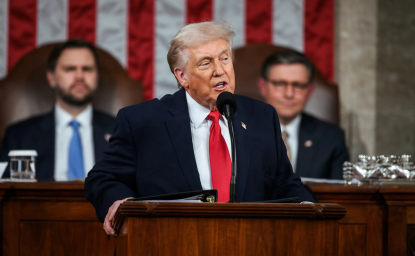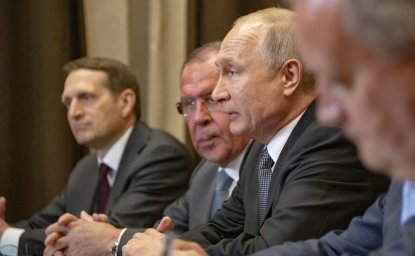This story originally ran in Politico on February 26.
Iran thinks it will benefit from the wave of unrest sweeping the Middle East, no matter how it turns out, a senior Iranian diplomat said. "The equations of power would be changed," said the diplomat, who asked not to be named. "There will be fewer and fewer countries listening to the United States."
Iranian President Mahmoud Ahmadinejad has talked in apocalyptic terms about the Arab uprisings. He said in Tehran last week, "changes will be forthcoming and will engulf the whole world from Asia to Africa and from Europe to North America."
But the Iranian diplomat's comments are a glimpse into a more measured strategic thinking—harder to dismiss as mere politicking. "If the regime in Egypt collapses," the diplomat said, "then U.S. influence will collapse. We now face a region with a different situation. The picture of the region will be changed."
He added: "The way things are moving ahead, we may be facing, in the near future, a region where countries are saying similar things on such issues as U.S. influence, nuclear issues, peace and security." The result would be that "there will be approaches and ideas more similar to that of Iran—a more Oriental and Islamic and Arabic approach."
His comments mirrored what some U.S. analysts have been saying. Alireza Nader, an expert in international affairs at the RAND Corp, told The New York Times, Saudi Arabia is worried "that the region is ripe for Iranian exploitation." A U.S. government adviser on the Middle East stated, "Iran is the big winner here."
The Iranian diplomat's analysis, however, bestowed the benefit on Iran independent of any national maneuvering. He predicted it would be due to a change in attitude throughout the Middle East—a shift from what he regarded as the colonial mentality that has reigned for so long.
Egypt, for example, with its role as a close U.S. ally, has often been an Iranian adversary. But now history is asserting itself, said the diplomat. "You know Egyptians are an old culture," he said, "very much like Iran, in terms of history and belief. It is a strong nation, 80 million population. These countries have been under pressure for some decades, with military suppression and government, economic problems, lack of dignity of the nation, no real elections."
"What I'm talking about in the region is, I agree, a movement towards democracy. But it does not necessarily mean that the influence of the United States or other modern countries is going to increase," the diplomat continued. He said Washington has been exposed as hypocritical, with its waffling over the fate of Egyptian President Hosni Mubarak, for example: first backing him and then making clear that he had to go. He said that if the demonstrators deserved to be supported, then why were they not backed "for the last 30 years" by pro-Mubarak U.S. governments.
The Obama administration has a riposte of sorts in its increasingly open criticism of the Iranian regime. It has been exceptionally direct in criticizing what it calls Iran's hypocrisy—supporting anti-government demonstrations in Arab countries, while repressing them brutally in Iran.
Some Western and expatriate Iranian analysts argue that Iran is itself a domino about to fall in a Middle East revival, though the timing for this could be years away.
What is most noteworthy in the Iranian diplomat's argument is that it is an over-arching strategic vision which predicts a sea-change in the region—however demonstrations and government transformations work out.
"It is too soon to judge the future of the Middle East," the diplomat said, "how the movement is going to go ahead. But I think that the future will tell us, which regime is correct." The reality, he said, is that there is a movement "towards democracy, towards freedom, toward respecting more Islamic ideas and distancing from the foreign occupation, foreign dictation and influence."
The Iranian assumption that democratic Arab regimes would be necessarily hostile to the United States or Israel, and not in fact hostile to an Iran seen as using nuclear sway and other power levers to dominate the region, can certainly be questioned. We do not know how the epochal events across North Africa and in the Gulf will turn out.
Iran's confidence that a movement built on human rights is certain to turn in its favor is, however, a clear sign that the United States is going to need creative and sustained diplomacy to protect its interests in a world catching us by surprise.
Related Links



